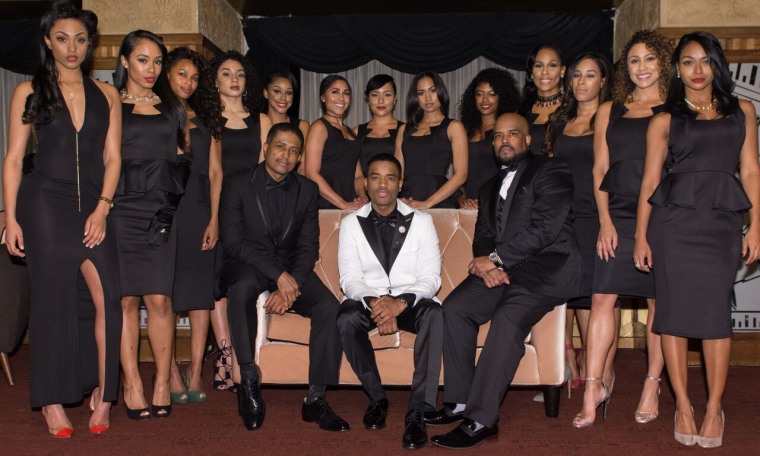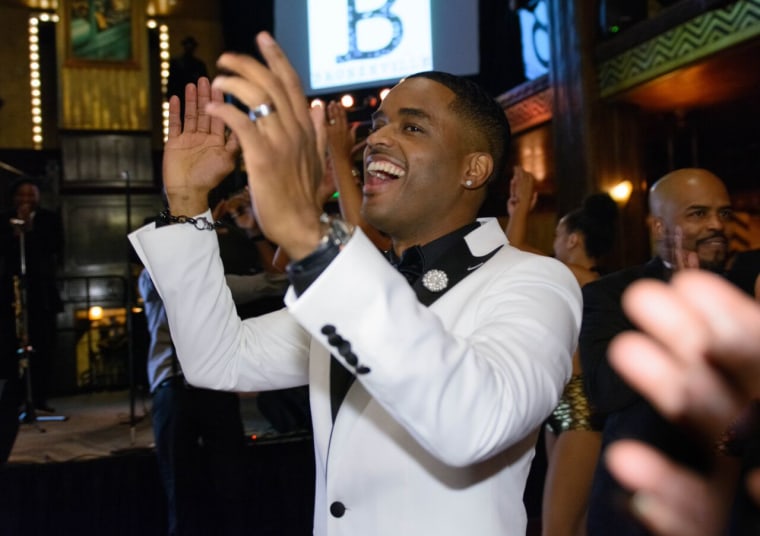In its heyday, Bronzeville was a thriving Chicago community comparable to Harlem. And, like the Harlem past referenced in the Netflix series Luke Cage and fully illuminated in films like "Hoodlum," it was policy — better known as numbers running, a precursor to the legalized lottery — that was a prominent part of life in Bronzeville as well.
Through their respective production companies TateMen Entertainment and Cinema Gypsy, Larenz Tate and Laurence Fishburne, along with Audio HQ, a digital audio ad sales company, have brought this unsung Chicago community to life with the star-studded “audio scripted drama” Bronzeville. Both Tate and Fishburne produce, direct and act in the series.
The 10-part podcast, which premiered February 7, is available every Tuesday on several platforms, including iTunes, Spotify, SoundCloud and Radio One/Interactive One.

Set in the late 1940s, Bronzeville revolves around the policy empire of the Copeland family, headed by currently incarcerated Everett Copeland, (Wood Harris), who has left his brother Jesse Copeland, (Omari Hardwick), in charge under the guidance of Fishburne’s Curtis “Eyeball” Randolph, who built the policy empire.
Fresh out of Arkansas, Jimmy Tillman, played by Tate, is an ambitious foot soldier in the Copeland policy empire with an eye on Tika Sumpter’s Lisa Copeland, the super smart and heavily protected sister of the clan. Tracee Ellis Ross also checks in as Anna, wife to Fishburne’s Curtis Randolph; Cory Hardrict is Casper Dixon, the friend who brings Jimmy into the Copeland orbit; Tate’s brother, a partner in TateMen Entertainment with Larenz and their brother Lahmard, plays Copeland brother Zeke.
Related: Chicago Artist Heals Through His Creations
Tate, who spearheaded Bronzeville, admits that he didn’t always know about the Chicago community’s fabled past. “Bronzeville was inspired by Quincy Jones back when I was in the movie Ray,” he shares. “I played Quincy Jones and got to spend some time with him and, being that I’m originally from Chicago as well as Quincy Jones, we began talking about Chicago and he brought up this community on the South Side of Chicago, Bronzeville, running numbers and things of that nature.”
Jones, Tate learned, had a very personal connection to Chicago policy. “He explained to me that his father ran numbers for a very well-off, well-to-do powerful family on the South Side of Chicago,” says Tate. But, as they continued to talk, it wasn’t so much the policy angle that really awed Tate.
“What I realized,” Tate elaborates, “is that [Bronzeville] was [one of many] communit[ies] that had established itself all over the country, mainly in the North after the Great Migration, [due to] people from the South coming to places like Chicago, Detroit, Cincinnati, St. Louis and Harlem . . . . Bronzeville was truly like a mecca, a metropolis, [in that it was among] sufficient black communities at a time in the 1920s, 30s or 40s, when we would assume that black folks dealing with Jim Crow oppression would never have the kind of opportunity or couldn’t even dream or imagine having a piece of the American pie.
“And we were able to obtain that on the South Side of Chicago in Bronzeville,” he continues. “And the real engine behind that was the economic infrastructure which was running numbers because the people who ran these numbers or these policies, they called them the Policy Kings and they were the pillars of the community and they decided to invest back into the infrastructure or invest back into the community to create an infrastructure where black folks had our own department stores; we had our own hospitals; we had our own schools, art museums; we had our police department; we had our own churches and grocery stores but also we had a political voice as well. A lot of people on the South Side of Chicago, black folks, were registered to vote.”

Taking Quincy Jones’ challenge that “Y’all need to tell this story” to heart, Tate and his brother tried for years to bring the Bronzeville community to life on the big screen. “We went to different studios in Hollywood,” he recalls. “They liked the idea but they just didn’t get behind it.”
When Cinema Gypsy, the production company of his good friend Laurence Fishburne, learned of the project, “they loved it,” says Tate. The two companies and friends joined forces to bring Bronzeville to life as a TV series but came up with the same problem as Tate and his brothers did when they pursued it on the big screen: no one was willing to back it financially.
By the time Audio HQ came calling, they embraced the idea of presenting Bronzeville on a different platform for today but one truer to the era in which Bronzeville is set, when radio shows ruled. “We brought it back to the genesis of entertainment,” says Tate.
Related: William Calloway, Chicago’s Unsung Hero
And just because Bronzeville is a podcast series, Tate is clear that they did not skimp on quality. “We wanted to make sure this was done special,” he says. “It was done high end, quality, second to none. We hired an Academy Award nominated writer. Went and got a historian. All the right things. We made sure we hired the best sound design, the best musicians to create the best score. We wanted this to really be ‘theater of the mind.’”
Critical to that is the actors, which total 50 in all, playing as many as 100 roles. “This is actors performing as though we were performing in a movie, on a stage at a play or on a TV show but you listen to it,” he stresses.
So far, Tate says, the reception has been very good. “For those who have been able to listen to it, they love it.”
Catch new episodes of Bronzeville every Tuesday until April 11.
